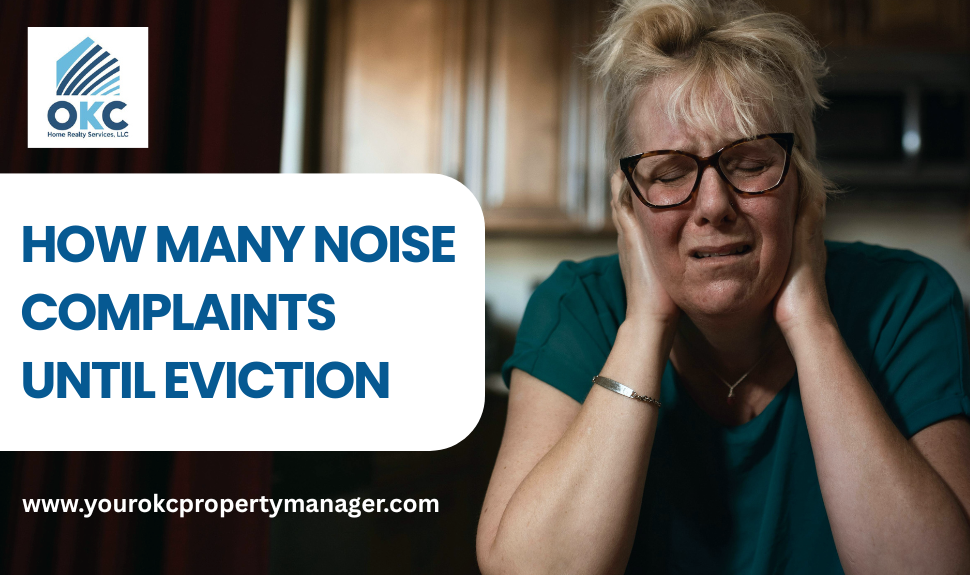Dealing with noisy tenants is one of the trickier aspects of property management. As a landlord or property owner, you want to maintain a peaceful rental environment while also respecting tenant rights. Noise complaints, whether it’s loud music, barking dogs, or late-night parties, are among the most common conflicts in rental housing, and if not handled properly, they can escalate into serious consequences, including eviction.
So, how many noise complaints does it take before you can legally evict a tenant? The short answer is: there’s no set number. Eviction for noise depends on the severity, frequency, and documentation of disturbances, as well as how well landlords follow legal procedures. Factors like lease terms, local laws, and the tenant’s response all play a role in determining whether eviction is appropriate.
With over 15 years of experience managing rentals in Oklahoma and nearby metro areas., I’ve seen how careful documentation, clear communication, and fair enforcement prevent minor noise issues from turning into costly legal battles. In this guide, we’ll explore how many noise complaints it typically takes to reach eviction, what the law says, how property managers handle these situations, and what landlords can do to prevent them altogether.
Key Takeaways
- There’s no set number of noise complaints that trigger eviction.
- Landlords must follow a clear escalation process.
- Keep detailed records to support your case in court.
- Tenants must get notice and a chance to fix issues.
- Local noise laws (like OKC’s 10 p.m.–7 a.m. rule) apply.
- Eviction should always be the last resort.
- Fair, legal action protects both parties.
- Clear leases and communication prevent noise disputes.
Understanding Noise Complaints in Rental Properties
Noise complaints are one of the most common reasons tenants reach out to landlords or property managers. While some disturbances are a normal part of living near others, others, especially repeated or excessive noise, can violate lease agreements and disrupt the entire community. Understanding what legally qualifies as a noise complaint is the first step in managing these issues effectively.
What Counts as a Noise Disturbance?
A noise disturbance is any consistent or excessive sound that disrupts other tenants’ right to quiet enjoyment. Common examples include:
- Loud parties or gatherings late at night
- Constant loud music or TV
- Barking dogs left unattended
- Repeated shouting, fighting, or domestic arguments
- Unnecessary use of loud appliances at inappropriate hours
Normal Noise vs. Nuisance Noise
Not every sound qualifies as a violation. Footsteps, moving furniture, or kids playing are usually considered normal living noises. However, when noise is habitual, excessive, or unreasonable, it can become a lease violation.
The key distinction lies in frequency, time of day, and intent. For example:
- A one-time birthday party that runs late may warrant a warning.
- Weekly loud gatherings after midnight could be cause for formal action.
Landlords or property managers must evaluate each situation carefully before escalating to eviction.
What the Law Says About Noise Complaints and Evictions
Every lease includes an implied right called the “covenant of quiet enjoyment.” This means tenants have the right to live peacefully without unnecessary disturbance. When a tenant repeatedly violates this right, through excessive noise or disruptive behavior, they may be in breach of the lease.
Lease Agreements and the Quiet Enjoyment Clause
Most leases contain language such as:
“Tenant shall not make or permit any noise that disturbs the quiet enjoyment of other tenants.”
This clause gives landlords the authority to issue warnings, lease violation notices, or even eviction proceedings if noise issues continue.
Local Noise Ordinances
Many local governments have ordinances limiting noise at certain times of day or decibel levels. For example, in Oklahoma City, residential noise is generally restricted between 10 p.m. and 7 a.m.
If tenants violate these ordinances, they may receive:
- A police warning or citation
- A formal complaint logged with local authorities
- Evidence that can support a landlord’s case for lease violation
Knowing your city or county rules or noise control laws ensures your actions are legally defensible.
Landlord’s Legal Duty
Landlords and property managers are also responsible for ensuring that one tenant’s actions don’t infringe on others’ peaceful enjoyment. You must address legitimate complaints in a timely manner. Ignoring repeated complaints could expose you to claims of negligence or failure to maintain habitability. However, you must also avoid retaliatory action; the U.S. Fair Housing Act and state laws protect tenants from eviction based on complaints they legally make.
How Many Noise Complaints Before Eviction Happens?
There’s no fixed number of noise complaints that automatically leads to eviction. Instead, the outcome depends on several factors:
- Severity and consistency of the noise
- Quality of documentation
- Tenant response after receiving warnings
- Local landlord-tenant laws
That said, there is a common escalation process that property managers and landlords typically follow.
1. Verbal or Written Warning
The first step is usually an informal warning. A property manager or landlord speaks with the tenant, explains the complaint, and reminds them of the lease rules. Often, this alone solves the problem.
2. Written Lease Violation Notice
If noise continues, the landlord issues a written notice of lease violation, outlining:
- The specific behavior causing complaints
- Dates and times of reported incidents
- The section of the lease being violated
- The action required to correct the issue
This notice may be called a “Cure or Quit” notice, giving the tenant a set number of days (often 3–10) to stop the disturbance or face eviction filing.
3. Final Notice or Termination of Tenancy
If the tenant ignores the notice or continues to disturb neighbors, the landlord may issue a termination notice or non-renewal notice. This indicates that the tenancy will end due to repeated violations.
4. Eviction Filing
When all else fails, eviction becomes the final option. The landlord files a case in local housing court. Judges generally expect proof that the tenant was given fair warning and an opportunity to correct their behavior.
In other words, eviction for noise complaints usually occurs after multiple documented violations, not just one or two complaints.
Habitual Nuisance vs. Isolated Incidents
- Habitual nuisance: Repeated disturbances can justify eviction even if only a few complaints have been made.
- Isolated incident: One complaint may not be enough unless the noise is extreme or dangerous.
What Landlords Should Do Before Evicting for Noise
Eviction should always be the last resort. Before taking that step, landlords must show they acted reasonably and followed legal procedure. Here’s how to do it right:
1. Investigate Complaints Thoroughly
Never rely on a single report. Speak with the tenant accused of making noise and others nearby (i.e., neighbors) and document their statements. Confirm that the complaint is legitimate and not a personal dispute between tenants.
2. Document Everything
Maintain detailed records including:
- Dates and times of each complaint
- Written or email communications
- Photos, videos, or audio (if available)
- Police reports or citations
This documentation becomes valuable if eviction proceedings reach court.
3. Send Proper Written Notice
The lease violation notice should:
- Reference the specific clause being broken
- Outline past complaints
- State the corrective action expected
- Warn of potential eviction if uncorrected
4. Offer a Chance to Correct Behavior
Many states require landlords to give tenants an opportunity to fix the issue before eviction. For example, a 7-day Cure Notice allows time to comply before filing.
5. Avoid Discrimination or Retaliation
Eviction cannot be based on protected characteristics or as retaliation for a tenant asserting their rights. Following the Fair Housing Act or state-specific landlord-tenant laws, like the Oklahoma Residential Landlord-Tenant Act guidelines, is essential to avoid legal exposure.
Tenant Rights in Noise Complaint Cases
Eviction isn’t one-sided. Tenants also have rights when facing eviction threats or unfair treatment. A landlord cannot remove them immediately after a complaint; proper notice and due process are required.
Right to Notice and Opportunity to Cure
Tenants must be notified in writing and given a reasonable time to correct the behavior. Evicting without this step can make a case invalid.
Responding to False Complaints
Sometimes, complaints may be exaggerated or made in bad faith. Tenants can:
- Request copies of written complaints
- Provide counter-evidence (e.g., quiet hours logs, witness statements)
- Communicate politely with management to resolve misunderstandings
Legal Defenses in Court
If an eviction case goes to court, tenants can argue:
- Lack of sufficient notice
- Inaccurate or unverified complaints
- Retaliatory eviction
- Violation of lease terms by the landlord
The Role of Mediation
Property managers often use neutral mediation before eviction. This helps clarify misunderstandings, establish behavior expectations, and maintain positive landlord-tenant relationships.
Understanding tenant rights helps landlords and property managers proceed fairly and legally, reducing the risk of litigation.
How Property Managers Handle Noise Complaints
Professional property managers use consistent systems to ensure fairness and compliance. Based on our experience managing Oklahoma rental properties, here’s how it’s typically handled:
- Receive and Record the Complaint – Every report is logged with date, time, and source.
- Investigate – Speak with involved parties and, if needed, nearby tenants for corroboration.
- Communicate Clearly – Issue a calm, professional notice reminding tenants of community expectations.
- Follow Legal Procedure – If noise persists, move to a formal lease violation notice.
- Resolve if Possible – Offer mediation or solutions such as quiet hours or relocation.
Real Example
We once managed a duplex in Edmond where one tenant played loud music late at night. After two written warnings and a police citation, the tenant apologized and complied. No eviction was needed.
The key takeaway? Documentation, communication, and consistency often prevent costly legal battles.
Tips to Prevent Noise Complaints in Rental Communities
The best way to avoid eviction over noise is prevention. Both landlords and tenants can take steps to maintain peaceful living conditions.
For Landlords and Property Managers
- Set Clear Lease Expectations: Include detailed noise policies in the lease.
- Remind Tenants Periodically: A simple email about quiet hours can prevent issues.
- Inspect Regularly: Routine property visits help identify recurring issues early.
- Design Smart: Use carpeting, weather stripping, and insulation to reduce sound transfer.
- Tenant orientation or handbook: Educate new renters about community expectations
For Tenants
- Be Mindful: Keep volume low, especially during quiet hours.
- Communicate with Neighbors: A friendly heads-up before hosting guests goes a long way.
- Address Conflicts Calmly: Talk it out before it escalates to complaints.
Good communication and respect within the community often solve noise problems before they reach the eviction stage.
Final Thoughts
Noise complaints are part of property management, but eviction doesn’t have to be the end result. Most issues can be resolved through communication, fair warning, and consistent enforcement.
Landlords should always document, investigate, and act lawfully before considering eviction. Tenants, meanwhile, should understand their responsibilities and rights to maintain a respectful living environment.
If you’re struggling with noise complaints, disruptive tenants, or community disputes, a professional property management company like OKC Home Realty Services can help.
Our experienced property management team can help you enforce lease terms legally and effectively, resolve conflicts professionally, and maintain a peaceful rental community, so you can protect your investment while keeping good tenants happy.
Disclaimer: This article is for informational purposes only and not legal advice. Consult a housing attorney for specific cases.
FAQs: Noise Complaints and Evictions
Can a landlord evict you after one noise complaint?
Not usually. One complaint typically results in a warning or written notice unless the disturbance is severe or requires law enforcement intervention. Habitual violations are more likely to lead to eviction.
How can a landlord prove noise complaints in court?
Through written complaints, witness statements, police reports, or direct observation. Consistent documentation is key.
Are police noise reports valid evidence for eviction?
Yes. Police or code enforcement reports strengthen a landlord’s case, especially for severe or repeated disturbances.
What if the noise is coming from non-tenants or guests?
Tenants are generally responsible for their guests. Landlords can issue notices to the tenant, not the guest, asking them to control the behavior.
Can tenants move out early due to noisy neighbors?
In some cases, tenants can claim “constructive eviction” if the landlord fails to address disturbances. Laws vary by state, so legal advice is recommended.
Can I be evicted for noise complaints without proof?
No, a landlord generally can’t evict you for noise complaints without proof. Eviction must be based on documented evidence that you violated the lease or disturbed other tenants’ right to quiet enjoyment. This proof can include written complaints from neighbors, incident reports, recordings, or warnings issued by property management.

Author
Scott Nachatilo is an investor, property manager and owner of OKC Home Realty Services – one of the best property management companies in Oklahoma City. His mission is to help landlords and real estate investors to manage their property in Oklahoma.
 (
(









